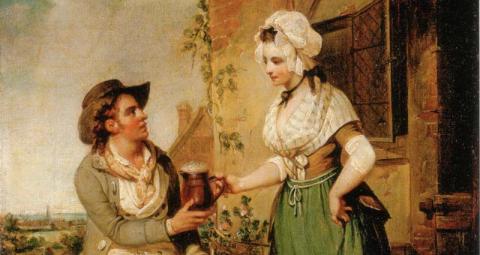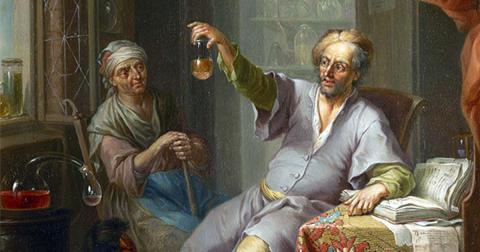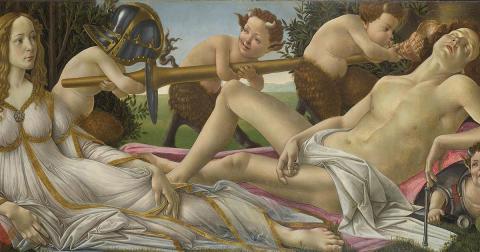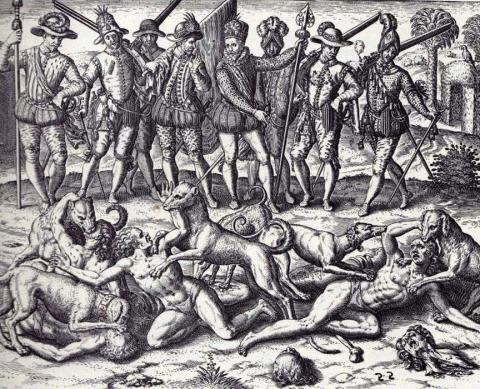"Brewing", "herbs," "broomsticks," "woman." When one hears these words together, most often the assumption is that the person in question is a witch. Yet brewing has another meaning - one that revolves around the avarice of alcohol. Alewives were women in the Middle Ages through the early modern period who brewed and sold alcohol. Due to the alewives' skills in the kitchen, fashion sense, and the eventual rise of urban guilds, however, the alewife soon became a term synonymous with "witch."
Medieval & Renaissance
Medieval & Renaissance Period.
Medieval Chastity Belts are a Myth
Chastity belts are items that titillate and fascinate in equal measure, inspiring the image of a medieval knight locking up his loved one’s private parts to ensure her abstinence during his absence. While exceptionally unhygienic, the belief that a padlock could protect a woman’s virtue has been ridiculed on countless occasions.
- Read more about Medieval Chastity Belts are a Myth
- Log in or register to post comments
The Dark Origins of Valentine’s Day
On February 14, couples from around the world recognize Valentine’s Day. For most, Valentine’s Day is a day of love, a day to shower a beloved with gifts and tokens of appreciation, to enjoy a romantic meal, and perhaps to share moments of intimacy. Cynics consider it to be a Hallmark greeting-card holiday, created by the retail business in order to get people to spend money on flowers, chocolates, stuffed animals, jewelry, travel, meals, and other luxuries.
- Read more about The Dark Origins of Valentine’s Day
- Log in or register to post comments
Soul Cakes – Snacks that Honor the Dead and Treat the Living
A soul cake is a small, round, lightly-sweetened treat which has been made by Christians since the eighth century to commemorate the dead on All Hallows’ Eve, All Saints’ Day, or All Souls’ Day. However, scholars suggest that the idea emerged from earlier pre-Christian practices.
What Could Your Urine Tell a Medieval Doctor?
Medieval Monsters Taught Morals in a Book of Beasts
During the Middle Ages the phoenix rose from its ashes to be reborn, dangerous dragons battled elephants to the death, and the pelican tore out its own breast to feed its young with its life’s blood – in bestiaries, that is.
- Read more about Medieval Monsters Taught Morals in a Book of Beasts
- Log in or register to post comments
Stiff Penalties in Historic Impotence Trials
The impotence trials of pre-revolutionary France sound a bit like a political joke. France had mostly squelched the ability for couples to divorce, and it was in this wake that the impotence trials arose.
- Read more about Stiff Penalties in Historic Impotence Trials
- Log in or register to post comments
Vestiges of the Vikings: Magic Buried in a Viking Woman's Grave
Murky, elusive and undefined, the religion of the pre-Christian Vikings has long been subject to debate. Contemporary texts of their spiritual worship do not survive, and the later records that do survive stem from Christian authors. Thus, they are tainted with a Christian worldview and anti-pagan opinions. The magic of the Vikings, however, is somewhat a secondary field of interest.
Grace O’Malley, the Pirate Queen of Ireland
Grace O'Malley was Queen of Umaill, chieftain of the O Maille clan, a rebel, seafarer, and fearless leader, who challenged the turbulent politics of 16th century England and Ireland.
- Read more about Grace O’Malley, the Pirate Queen of Ireland
- Log in or register to post comments
Becerrillo: The Terrifying War Dog of the Spanish Conquistadors
Dogs have been used as powerful weapons of war for at least the last 3,000 years. The ancient Egyptians, Greeks, Persians, Sarmatians, Britons, and Romans are all known to have used dogs in combat, or for scouts, sentries, trackers, or executioners. But the Spanish conquistadors employed war dogs on a scale that had rarely been seen before, and with devastating effect.
Pagination
- Previous page
- Page 2
- Next page













